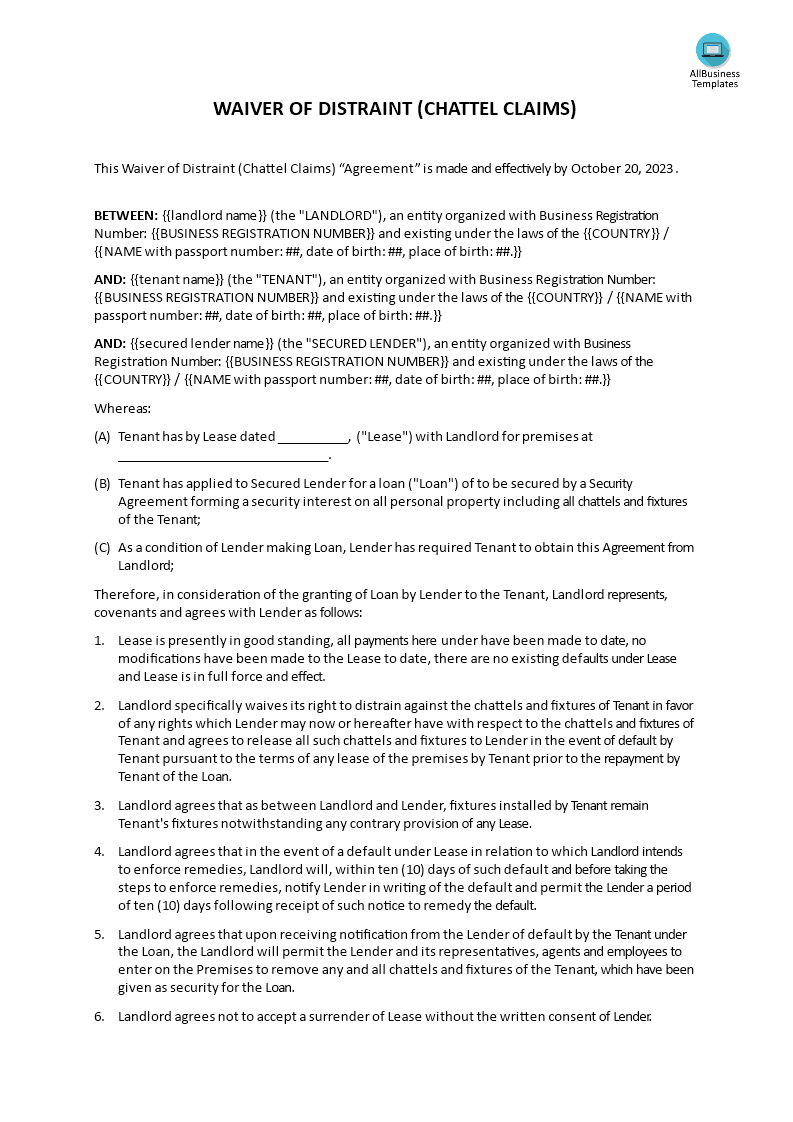Waiver of Distraint
Save, fill-In The Blanks, Print, Done!

Download Waiver of Distraint
Today: USD 1.99
Download It Now

Available premium file formats:
Microsoft Word (.docx)- This Document Has Been Certified by a Professional
- 100% customizable
- This is a digital download (27.11 kB)
- Language: English
- You will receive a link to download the file as soon as your payment goes through.
- We recommend downloading this file onto your computer.
Do you need a
Waiver of Distraint (or chattel claims)? Is it possible to waive the distraints? What is the process? Check out our waiver template which is available to download. Our template is easy to use and customizable to fit your needs. It's a great way to protect yourself and your possessions.
A Waiver of Distraint is a legal document in landlord-tenant law that serves to waive or relinquish a landlord's right to distrain or seize a tenant's property as a means of recovering unpaid rent or other debts owed by the tenant. Distrain refers to the act of seizing a tenant's personal property to satisfy outstanding rent arrears or other financial obligations.
In some jurisdictions, a landlord may have the legal right to distrain or repossess a tenant's personal property to recover unpaid rent or other amounts owed under the lease agreement. This process typically involves the landlord taking possession of the tenant's possessions and selling them to cover the debt. However, tenants may have the option to negotiate with their landlords and request a Waiver of Distraint to prevent this action.
Here's how a Waiver of Distraint generally works:
- Negotiation: The tenant, who may be facing financial difficulties or challenges in paying rent, initiates negotiations with the landlord. The tenant proposes a plan to address the outstanding rent or debts, such as a payment plan or a lump-sum settlement.
- Waiver Request: As part of these negotiations, the tenant may request that the landlord sign a Waiver of Distraint, waiving the landlord's right to distrain or seize their property. This waiver is a legal agreement that prevents the landlord from taking further action to repossess or sell the tenant's personal belongings.
- Terms and Conditions: The Waiver of Distraint typically includes specific terms and conditions agreed upon by both parties. This may involve the tenant's commitment to making payments according to the agreed-upon plan or settlement.
- Mutual Agreement: Both the landlord and tenant must agree to the terms and conditions outlined in the waiver. Once both parties have signed the document, it becomes legally binding, and the landlord cannot proceed with distraint.
- Enforceability: The enforceability of a Waiver of Distraint depends on the laws and regulations of the jurisdiction in which the lease agreement is governed. Not all jurisdictions permit distraint, and even in those that do, certain conditions and procedures must be met.
It's important to note that the availability and terms of Waivers of Distraint can vary widely depending on local laws and the specific lease agreement. Tenants facing financial difficulties should consult with legal counsel or seek advice from a tenants' rights organization to understand their rights and options in their particular jurisdiction.
Download this professional
Waiver of distraint (chattel claims) template now!
For more business templates? Just browse
through our database and website! You will have instant access to thousands of
free and premium business templates, legal agreements, documents, forms,
letters, reports, plans, resumes, etc., which are all used by professionals in
your industry. All business templates are ready-made, easy to find, wisely
structured and intuitive.
DISCLAIMER
Nothing on this site shall be considered legal advice and no attorney-client relationship is established.
Leave a Reply. If you have any questions or remarks, feel free to post them below.
Related templates
Latest templates
Latest topics
- Excel Templates
Where do I find templates for Excel? How do I create a template in Excel? Check these editable and printable Excel Templates and download them directly! - GDPR Compliance Templates
What do you need to become GDPR compliant? Are you looking for useful GDPR document templates to make you compliant? All these compliance documents will be available to download instantly... - Google Docs Templates
How to create documents in Google Docs? We provide Google Docs compatible template and these are the reasons why it's useful to work with Google Docs... - IT Security Standards Kit
What are IT Security Standards? Check out our collection of this newly updated IT Security Kit Standard templates, including policies, controls, processes, checklists, procedures and other documents. - Letter Format
How to format a letter? Here is a brief overview of common letter formats and templates in USA and UK and get inspirited immediately!
cheese
